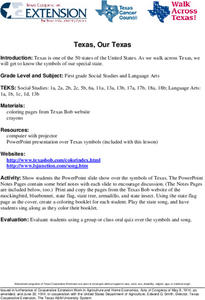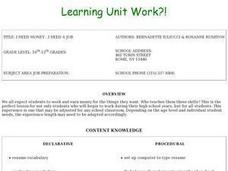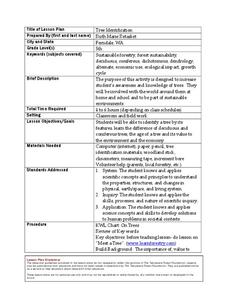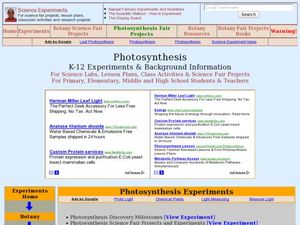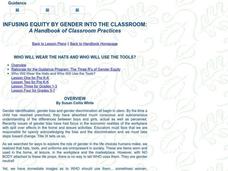Curated OER
Zoo Poo
Students use Internet research to determine the amount of carbon dioxide produced per unit energy for biomass and coal. In this alternative energy instructional activity, students research to find out how much energy and carbon dioxide...
Curated OER
Cartoons for the Classroom: May Day for Immigration Debate
In this current events worksheet, students analyze political cartoons about the immigration debate. Students respond to 3 talking point questions.
Curated OER
Geography Awareness Week: Practice Mapping Skills
You won't get lost, after learning map skills during Geography Awareness Week.
Curated OER
Inspirational Mapping for the Corps of Discovery
Third graders use a computer software entitled, Inspiration, in order to create a map or web of what Lewis and Clark should have packed for their journey west. They are given the expectations of the teacher and a scoring guide is...
Curated OER
Consumer Culture in the 1950s: New Shopping Centers and Advertising trends
Eleventh graders analyze the cultural and social aspects of the 1950s. Using primary source documents, they work together to determine what society was like. They use that information to write an essay about how their information...
Curated OER
Sustainable Dining
Students identify consumer products and sustainable foods. They calculate the differences in prices and applying those prices to the cost of a meal. They also discuss the costs and benefits of buying sustainable products.
Curated OER
Texas, Our Texas
Students watch a PowerPoint slide show of the symbols of Texas and discuss what they see. They color in coloring book pages that corrolate to the slide show. They listen to and sing along to a state song as they color.
Curated OER
Healthy People 2010
Ninth graders log on to the attached website. They use the "Online Slide Show" and think about the questions in the guide. They complete the slide show and guide, then and share their suggestions with the class.
Curated OER
I Need Money...I Need a Job
Young scholars discover how to use a phone book and the want ads to find a job, how to fill out a job application, and how to write/type a resume. They participate in a mock job interview.
Curated OER
Team Players
Students examine a school to career website. They collect and collate data about careers from their own data collection. They determine which skills and abilities ensure successful teamwork. They research two careers that they come...
Curated OER
Interview a Professional: Professional Sports
High schoolers research a career featured on a career website. They email an expert in the field of their choice. They conduct a questionnaire of the expert and record their findings. They collate their information and write a written...
Curated OER
Interview a Professional: Marine Mammal Rescue
Students choose a career featured on the school to career website. They research the career and email an expert in the field of their choice. They answer a series of questions and write a written report on their findings and present...
Curated OER
Ford's Revolution (Differentiated by Ability)
Students explore the effects of Ford's use of the assembly line, auto financing, and increased wages to make his fortune. They complete a worksheet using the internet.
Curated OER
The Business of Design
Learners visit the Design for the Other 90% exhibition. In this design lesson, student learn how to design for the population of the world that is poor or impoverished. In addition, students read New York Times articles and watch videos...
Curated OER
It's Your Future
Students learn about productive resources along with their requirements, supply and demand, savings, investments and interest rates. In this supply and demand instructional activity, students create a career plan and personal budget of...
Curated OER
Nebraska Entrepreneur Success Stories
Learners explore entrepreneurs of Nebraska. In this business and social studies activity, students research Nebraska entrepreneurs to discover the history of their successful company.
Curated OER
The Plight of Women's Work in the Early Industrial Revolution in England and Wales
High schoolers read about, discuss, and answer questions regarding the various jobs women performed in the early Industrial Revolution in England and Wales.
Curated OER
Breakfast for Champions
Students prepare an event to honor philanthropic activities in their community. In this common good lesson, students send out invitations to local non-profits or to those who engage in philanthropic activities and plan an awards...
Curated OER
Tree Identification
Students list four ways to identify trees. In this tree identification instructional activity, students use tree identification techniques such as leafs, bark, wood grain, soil type, and climate to create tables and graphs.
Curated OER
Photosynthesis
Young scholars explore the concept of photosynthesis. They describe the light and light independent reactions of photosynthesis. Students relate physical plant characteristics to their functions. They distinguish between C3, C4, and CAM...
Curated OER
Teaching in a Time of Crisis
Young scholars react to the current financial crisis. In this community building lesson, students are given the opportunity to voice their thoughts and feelings on the current financial crisis in the safety of a classroom meeting.
Curated OER
Module 8-Tax Credit for Child and Dependent Care Expenses
Students explain the tax credit for child and dependent care expenses. They distinguish between a tax deduction and a tax credit. They see how the tax credit for child and dependent care expenses affects the tax liability.
Curated OER
Infusing Equity By Gender Into the Classroom
Students participate in activities to develop life skills related to gender equity. In this gender equity activity, students examine the roles of people using hats. Students will role play various occupations related to the hats....
Curated OER
Primary Process in Elections
Students read "How Does the Primary Process Work" and complete the accompanying worksheet. They explore how the primary and caucus process works in small groups or in pairs. They answer questions based on the primary process to...








